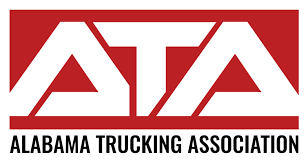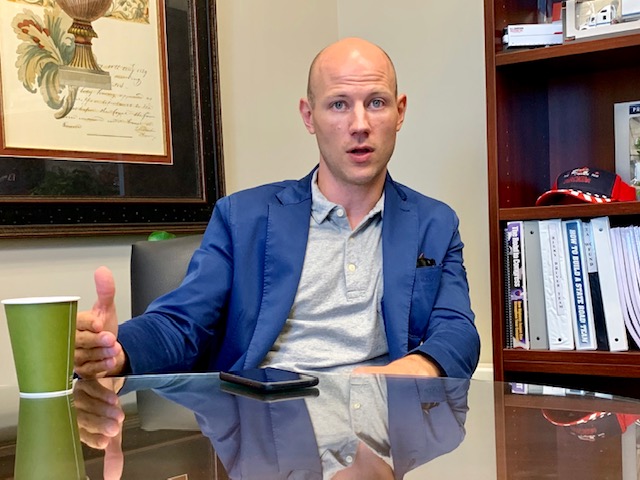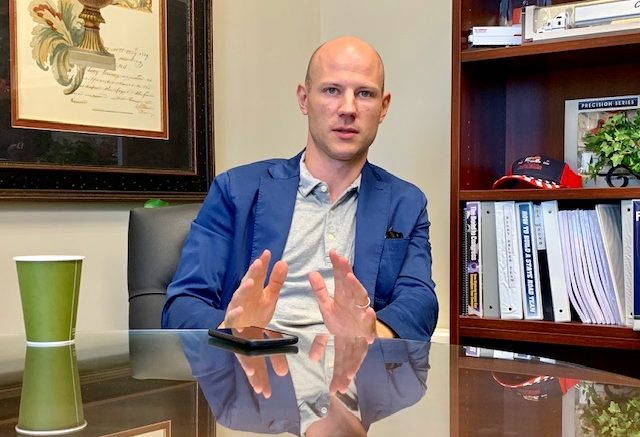Alabama Trucking Association’s new president brings passion, enthusiasm to spread the state industry’s story
By Al Muskewitz
Wright Media Editor
Mark Colson’s duties as the new president and CEO of the Alabama Trucking Association are about what one might expect for a person in that position – administrator, chief advocate, lobbyist, champion. But there’s another element he has embraced that’s not necessarily contained in the formal job description.
Story teller.

The new face of the state’s trucking industry is a 34-year-old former small college football player who, along with all the formal responsibilities that come with the job, has taken it upon himself to tell and forward the positive stories of the impact made by the 700-plus carriers and allied members of the association and 22,000 statewide truckers that sometimes gets lost in the noise of some overbearing media.
“We’ve just got to tell our story and we’ve got a great story to tell,” he said. “Let’s tell it and be proud of it.”
Colson takes he reigns from Frank Filgo, who guided the ATA through one of the longest and most successful tenures in its history, and Colson rightly praised Filgo and the board for a legacy that has garnered high respect from within the legislature to an industry that in some states is treated hostilely by policymakers.
It was on Filgo’s watch the ATA scored some of its more substantial political wins and court victories. He was already part of the organization’s management structure for nine years when Colson was born and the new president was 9 when his predecessor became CEO. That’s a wealth of experience Colson was eager to absorb.
He spent a solid two-month transition under Filgo’s wing before assuming full authority Aug. 1. Initially, because of the established success of the organization, his plan was to “settle in, take notes, buy in” to everything trucking, but with Filgo and another long-time staff member retiring on the same day, instead of having the luxury of landing with the ease of an Air Force-trained pilot, gliding onto the runway, he hit the tarmac like a Navy man landing on an aircraft carrier.
And he wasted little time working to get the story out. Shortly after coming on board he penned a 300-word editorial for a statewide media outlet in which he detailed the strength, value and viability of the trucking industry in Alabama. He immediately received three texts in response to the piece – one from a football-playing friend as far away as France – inquiring about CDL opportunities in the capital region.
“I’m not going to say that’s going to move the needle on employment in our industry, but that’s the tone I think we can set here as I’m getting my feet wet with the association,” Colson said.
He also has met with numerous industry leaders throughout the state to hear their concerns and insights on all things trucking. His plan is to personally visit all 55 ATA board members within his first year on the job; he’s seen about 25 percent of them already.
Colson, who has a seven-year contract, readily admits that growing up changing truck tires in his family’s third-generation tire business in Chilton County doesn’t adequately qualify him to lead an organization that has been working for Alabama truckers since 1939, but it certainly instilled in him an appreciation for hard work and the hard-working people already in the industry.
“That’s why I’m more motivated professionally than ever, because of the people who are in this industry,” he said. “The people who run these companies, the people who drive the trucks, the people who work on the trucks, the people who sell the trucks. I think too many times we talk about the trucking industry in terms of our economic impact and – as I’m looking at the interstate with trucks moving down the road – the physical objects. Those are just tools. The industry is made up of people and the people who do this work. The people make all this happen.
“The old saying was if you got it, it came on a truck. That’s great. I like to say if you got it, it came from a trucker. I tell our team here we’re truckers. That’s the hat we wear and I’m proud of it. It’s nothing to be ashamed of and everything to be proud of. … I’m here to be part of the trucking industry.”

The ATA and the trucking industry are not new worlds to him. He worked closely with them during his 12 years with the Business Council of Alabama, where he served in multiple roles, including senior vice president for government affairs, chief of staff and interim president. He was part of the team that brought all the stakeholders together to help push through recently signed gas tax legislation, formally known as the Rebuild Alabama Infrastructure Bill, to adequately fund restoration of the state’s aging roads and bridges – one of several issues high on his priority list. The first part of the tax – a 6-cents-per-gallon increase – kicks in Sunday.
One thing his new position has done is change the way he looks at who’s sharing the road with him. Now when he comes upon a truck he pays closer attention to the type of CMV it is and quickly checks to see if the logo on the door panel lines up with the ATA membership rolls.
Even though he’s only been in the office a few months, he is keenly aware of the issues that move the industry. The biggest big-picture issues for the Alabama trucking industry are about the same as they nationwide – in no particular order: recruiting/retention, infrastructure and technology. Colson’s passion comes through when he talks about each.
Recruiting and retention: “How do we generate more professionals for our industry? That’s No. 1, that is the issue that matters the most. We have to take care of our professionals in our industry, it’s on us to treat them well, pay them well, provide good benefits and these jobs do. There are jobs right now available. We have to identify the kind of people who want to work in our industry and I think one way to do that is tell the story of the people who work in our industry. There are some great stories to tell.”
Infrastructure: “We passed the bill, we have to implement it. We can’t stop that conversation; we have to continue to talk about safe and efficient infrastructure. We need a federal infrastructure plan. One of the reasons this I-10 bridge project (in Mobile) has become so controversial is because there’s no federal funding because we don’t have a federal infrastructure plan. We’re talking about building an interstate bridge without federal funds. We need Congress to act. (There is a federal grant for the $2.1 billion project, but it accounts for only about six percent of the estimated cost.)
“If you go back to the 2016 election, Clinton-Trump, the only issue they campaigned on they agreed was infrastructure. Nice things and safe things cost money so we need to be reasonable about how we put solutions on the table. Nobody wants to pay a little more but this is not that much more but look what we’re going to get for it. That’s how you sell something. I think we can do the same thing at the federal level. We certainly need it.”
Technology: “Technology is a major issue. It’s a disruptor for our industry like it is any industry but look at the solutions that are being put in place due to technology. Truck crashes are significantly down because of technology. Hiring professionals via technology, it’s more efficient than ever to be able to figure out and find a job. It’s not perfect, but it’s better than ever.”
Of course, he has his finger on the pulse of driver-centric issues, too, such as ELDs, hours of service, tolling and a uniform national speed limit. When it comes to those issues, Colson is all about adopting measures based on data-driven safety reports and common-sense approaches.
If there’s one issue that does get under the new president’s skin it’s the way the industry is portrayed by those loud ads from plaintiff trial attorneys. Trucking is a safety-conscious industry, Colson said, even though the lawyer commercials on TV might suggest otherwise. That’s another reason he wants to get trucking’s story out there.
“We’re a safe industry and if you look on TV and listen to plaintiff trial attorneys talk about our companies or go to any of their websites it’s how do you sue a trucking company,” Colson said. “I’m not arguing against justice of what’s fair, but many times the way our industry is being characterized is unfair and that’s why we’re going to tell our story. We have a great story to tell. We’re a safe industry that creates jobs for families in this state and we’re going to keep doing that.
“If you got it, it was brought to you by a trucker. Practically everything you see was moved by a trucker at some point or another. That’s something to be proud of, not criticized by folks who want to get on TV just to generate revenue.
That said, if there are issues that need to be litigated and all that we have a justice system for that, but I think that’s another major issue for our membership. Candidly they’re sick of it. We’re sick of it, because it’s not how we operate. It’s not who we are as an industry. It’s disrespectful to the men and women who work in our industry to characterize our industry that way and we’re going to do a better job of telling our story. They can say all that they want to say, that’s their business, that’s who they are. We’re going to tell our story and it’s a great story to tell.”
Colson said trucking in Alabama, from a reputation, financial and ATA membership standpoint, is “as strong as it’s ever been.” Trucking-related businesses provide more than 107,000 jobs in the state – about 6.5 percent of the workforce – and not just drivers, but diesel techs, fleet managers, safety/HR professionals and logistics specialists. The pay is good and as the economy continues to grow more professionals will be needed.
“It’s a great time (to be ATA president and CEO),” he said. “I’m ready to roll. We’re moving. We’re not sitting on our hands or resting on our past successes. We’re looking to the future and we’re going to tell our story.”


Leave a comment